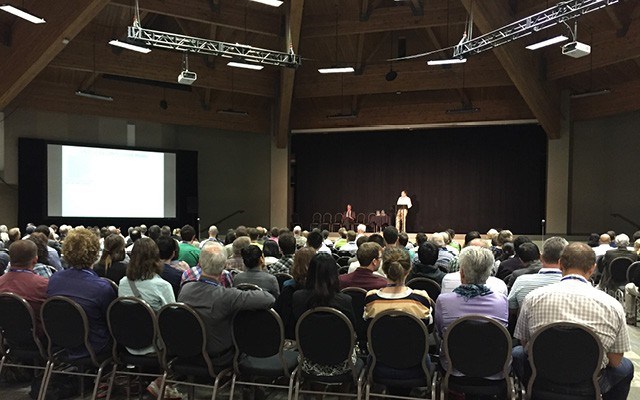Looking at the schedule for the Canadian Meteorological and Oceanographic Society's (CMOS) 49th Congress — which was in Whistler May 31 to June 4 — you might be forgiven for feeling somewhat inadequate.
The CMOS congress agenda is packed wall-to-wall with the kind of technical, scientific discussions typically reserved for those with big, important letters after their names.
"Basically, any scientific advances in meteorology, oceanography, climate sciences (and) glaciology are discussed at this annual conference," explained Ken Kwok, chair of the organizing committee for CMOS.
This year's congress — held in conjunction with the American Meteorological Society — played host to about 450 attendees and 350 presentations, Kwok said.
The theme for this year's congress was Tropics to Poles: Advancing Science in High Latitudes.
But it wasn't all high-level scientific discussion. Part of each CMOS Congress involves inviting local teachers to participate in Educators' Day — where field experts work with teachers to provide new ideas for the classroom.
Topics on the schedule for this year's Educators' Day included polar exploration in the arctic, oceans and clouds.
About 20 teachers from the Sea to Sky took part, including three from Whistler.
One presentation that stood out for Whistler Secondary School teacher Emma Mullings was by Natasha Ewing of Ocean Networks Canada.
"They've been making huge discoveries about ocean pollution and they're able to see and monitor a lot more marine life than we were previously aware of, and the patterns of that marine life by using ultrasound... their website allows you to freely access their real time data," Mullings said.
"My intention is to build that into my Biology 11 unit, so that students are not just being given an old chart, but they're actually then being given an activity that sends them to something that is real time."
Educators' Day is reflective of the shift currently happening in public school curriculum, Mullings said, which is moving towards project-based learning and more community involvement.
"All of the presenters at CMOS Educators' Day were providing access and expertise to real time data and current research to allow for authentic project opportunities in the classroom," she said.
"They were also locally based, so the research and data was perhaps more relevant to the students."
Presenters were open and accessible to teachers, she said, going so far as to share resources and even their emails with teachers who wanted to follow up with them.
"I was inspired, and I think if I'm inspired that makes it easier for the students to get inspired," Mullings said.
"My big belief in education is that students enjoy learning. That's my goal. And if I can make a change to my course that makes that course more engaging and the students actively are enjoying what they're learning, then that's good."
The type of knowledge sharing found at CMOS — between scientific experts and their peers, and in turn to the general public — is crucial to the scientific community, Kwok said.
"This is the only conference in Canada on climate science, weather and ocean sciences," Kwok said. "To share the latest advances in the sciences every year is very important."




